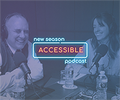Community Education and Dissemination Council (CEDC)
Purpose
Download this one page flyer about CEDC to print or share. ![]()
CEDC serves as a focus for the identification and discussion of issues regarding community education and information dissemination; serves as a representative voice of the community education interests and concerns within the network; and influence the development and implementation of national community education and information dissemination policies and initiatives.
How CEDC Relates to AUCD and Its Work
CEDC works for and with AUCD network members who educate, disseminate information to, and otherwise engage with community members. CEDC fulfills its purpose and the mission of AUCD and its constituent membership by serving as a conduit for technical assistance, providing input into policy, and engaging in other support activities deemed necessary to advance the mandate for community education and dissemination. The Council helps the association to:
- Set and accomplish knowledge-sharing goals specified in the AUCD Strategic Map
- Carry out training activities to inform Network members on important and emerging community education and dissemination topics
- Develop the capacity of network members to conduct quality education and dissemination activities
- Identify topics of common interests to network members and develop recommendations to the AUCD Board
- Lead the network in involving people with disabilities from diverse cultures to participate in community education and dissemination activities
Membership
The Council is composed of not more than two representatives from each AUCD member program who is the Community Education and/or Dissemination Director/Coordinator or a designee who best represents the overall community education and information dissemination interests of that center or program.
Membership Expectations
The full Council meets face-to-face once a year in conjunction with the AUCD Conference. The CEDC Steering Committee and the Council's other working Committees also meet in person once a year and at least three additional times during the year through conference calls.
2018 Focus Areas
- Strengthen connection among AUCD, Councils, and SIGs
- Supporting AUCD Strategic Map
- Inclusion and utilization of Trainees
- Developing "Best Practices" & database to support network
- Develop and host webinars related to accessibility
- Supporting accessibility for AUCD Conference
CEDC Leadership
- Chair: Beth Boone, PhD, BCBA
Email: [email protected] - Vice Chair: Kristine Nellenbach
Email: [email protected] - Secretary: Miranda Hooper
Email: [email protected] - AUCD Staff Liaison: Anna Costalas
Email: [email protected]












